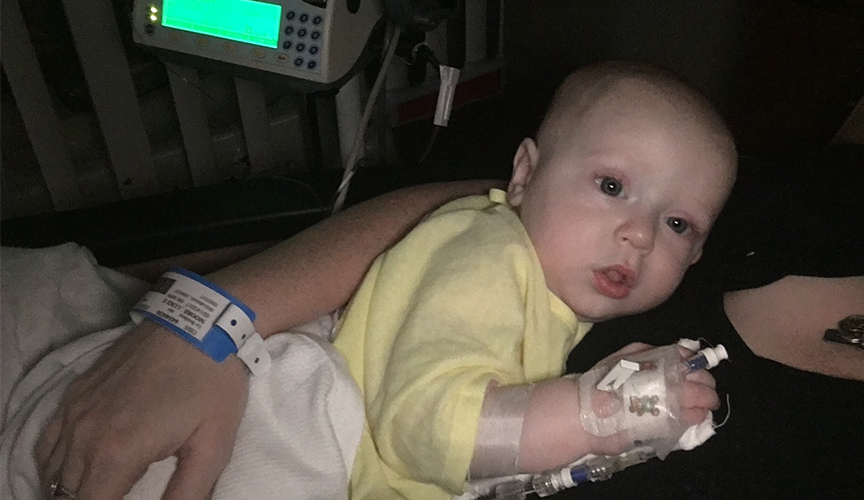The Other Side
The first signs are hard to recognize. Constipation and an ear infection. When Raechyl Moore took her baby to the pediatrician with those symptoms, the visit seemed pretty routine.
Who would think of botulism?
But in less than three days, Raechyl’s son Luke couldn’t lift his head. He was starving but couldn’t swallow. Gone were his abilities to sit up, pull up or crawl.
As a neonatal intensive care nurse, Raechyl knew her son needed expert attention, and fast. She drove from her home in Atoka, Tenn., to the same place she’s worked for the last seven years, but this experience was new. Because this time, she arrived in the Le Bonheur Children’s Hospital parking lot not as an employee, but as a mom.
As soon as Raechyl and husband, Keith, brought Luke in, the family was consulted by a team of specialists ranging from neurology to infectious disease. Fewer than 100 babies are diagnosed with botulism in the United States each year. Luke was one of them, with doctors hypothesizing that he ingested the bacteria from spores on the ground stirred up during construction near his home.

Botulism is a life-threatening bacterial illness. Early detection and treatment are critical. As soon as Luke was diagnosed, Le Bonheur flew in an antitoxin out of California — the only drug treatment available.
“It was amazing how quickly everything happened, how proactive everyone was,” said Raechyl. “I knew that the key to surviving was to be at a hospital that recognized the need to protect the airway.”
The toxins in Luke’s system prevented him from being able to swallow and threatened to paralyze his respiratory muscles. He was moved to the Pediatric Intensive Care Unit for close monitoring in case he needed to put on a breathing machine.
Despite the overwhelming situation, Raechyl said she was filled with gratitude during this time.
“My most grateful moment was when they made me a part of his care team and had the confidence in me as a nurse and a mother to keep his airway clear until the medicine arrived to stop the progression of his disease,” said Raechyl. “Because of this, Luke did not have to be intubated, and I held him upright in a chair for three days and cleared his secretions for him to protect his airway. He was never intubated or placed on the ventilator because of their willingness to involve me in his care plan.”
Thanks to the swift arrival of the antitoxin, Luke’s Le Bonheur stay was reduced from an expected two to three months to 16 days. When Raechyl later put on her scrubs and returned to work, she said she had a new perspective on the importance of giving back to Le Bonheur.
This October, a year after Luke’s hospitalization, the Moores are giving back through the Le Bonheur Pumpkin Run 5K. Luke will serve as the honorary chair, and the Moores are inviting friends, family and co-workers to join their team and help fundraise for the hospital.
“It makes me feel so good to know that the way we talk about patient experience here is real,” she said. “I donate to Le Bonheur because I want people to know that I believe in what I work for, honestly. I couldn’t be more grateful. I know that what they did for my son, they do for all the kids in Memphis. It means the world to me.”
Visit www.pumpkinrun.org to register for the race, donate to a team or form a team for your friends and family! Save the date: October 20, 2018
Help us provide the best care for kids.
Le Bonheur Children's Hospital depends on the generosity of friends like you to help us serve 250,000 children each year, regardless of their family’s ability to pay. Every gift helps us improve the lives of children.
Donate Now









